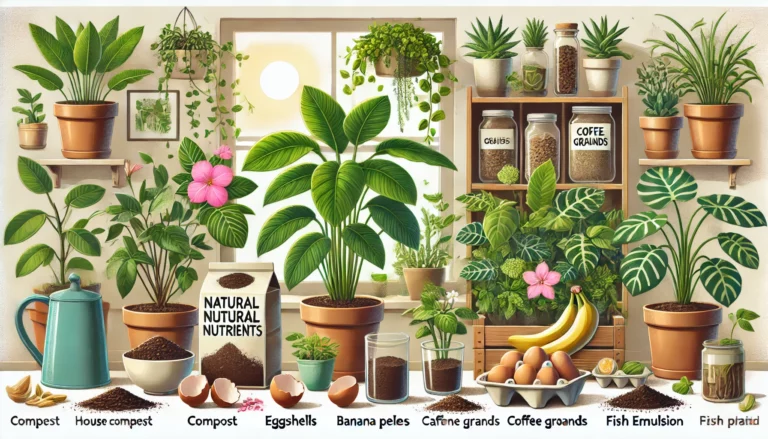Introduction
Houseplants add beauty and freshness to indoor spaces but require proper nutrients to thrive. Using natural nutrients for your houseplants promotes healthy growth and keeps your indoor environment free from harmful chemicals. This guide explores various natural nutrient sources and tips to keep your houseplants vibrant and healthy.
Understanding Plant Nutrient Needs
Plants need various nutrients to grow, including macronutrients like nitrogen, phosphorus, and potassium and micronutrients like iron, magnesium, and calcium. Understanding these needs helps you provide the right balance of nutrients.
Macronutrients
- Nitrogen (N): Promotes leaf and stem growth.
- Phosphorus (P): Keeps root development and flower production.
- Potassium (K): Increases overall plant health and disease endurance.
Micronutrients
- Iron (Fe): Essential for chlorophyll production.
- Magnesium (Mg): Aids in photosynthesis.
- Calcium (Ca): Strengthens cell walls and supports growth.
Natural Nutrient Sources
Several natural sources of nutrients can be used to feed houseplants, providing them with the essential elements they need to thrive.
Compost
Compost is a splendid source of organic matter and nutrients. Using compost as a top dressing or mixing it into potting soil improves soil fertility and structure.
Worm Castings
Worm castings are a highly nutritious form of compost produced by earthworms. They contain beneficial microbes and nutrients that promote healthy plant growth.
Homemade Fertilizers
You can create your own natural fertilizers using household items and kitchen scraps.
Banana Peels
Banana peels are rich in potassium. Soak banana peels in water for a few days and use the water to water your plants.
Eggshells
Eggshells provide calcium. Squash them into a fine powder and mix them into the soil.
Coffee Grounds
Coffee grounds add nitrogen to the soil. Sprinkle them lightly on the soil surface or mix them into the potting mix.
Organic Liquid Fertilizers
Organic liquid fertilizers are simple to apply and provide immediate nutrients to houseplants.
Seaweed Extract
Seaweed extract is rich in trace minerals and plant growth hormones. Dilute it with water as a foliar spray or soil drench.
Fish Emulsion
Fish emulsion is high in nitrogen and nutrients. Dilute it with water according to the instructions, and use it to water your plants.
Compost Tea
Compost tea is assembled by steeping compost in water. It provides a balanced mixture of nutrients and beneficial microbes. Use it to water your plants or as a foliar spray.
Soil Amendments
Adding natural soil amendments improves soil fertility and provides long-term nutrient benefits.
Epsom Salt
Epsom salt supplies magnesium and sulfate. Dissolve a tablespoon in a gallon of water and use it to water your plants once a month.
Bone Meal
Bone meal is extreme in phosphorus and calcium. Mix it into the potting soil to support root development and flowering.
Green Sand
Green sand provides potassium and trace minerals. Mix it into the soil for a slow-release nutrient source.
Proper Watering and Care
Providing natural nutrients is just one aspect of caring for houseplants. Proper watering, light, and care practices are equally important.
Watering
Water your plants, allowing them to meet their specific needs. Over watering can lead to root rot, while underwatering can cause nutrient deficiencies.
Light
Ensure your plants receive adequate light for photosynthesis. Adjust their placement based on the light requirements of each plant.
Pruning
Regularly prune your plants to eliminate dead or yellowing leaves and promote healthy growth.
Troubleshooting Nutrient Deficiencies
Identifying and addressing nutrient deficiencies helps maintain healthy houseplants.
Common Signs
- Yellowing Leaves May indicate nitrogen deficiency.
- Stunted Growth: This can be caused by phosphorus deficiency.
- Leaf Curling: Often a sign of potassium deficiency.
Remedies
- Adjust Feeding: Ensure you are providing balanced nutrients.
- Soil Testing: Test the soil to identify specific nutrient deficiencies and adjust accordingly.
Conclusion
Using natural nutrients for houseplants promotes healthy growth and a safer indoor environment. You can keep your houseplants thriving by understanding your plants’ nutrient needs and using natural sources like compost, homemade fertilizers, and organic liquid fertilizers. Start nourishing your houseplants naturally and enjoy the lush, vibrant greenery they bring to your home.
- Growing Bonsai: Tips for Miniature Tree Enthusiasts
- Buying Bonsai: Tips for Selecting Your Perfect Tree
- Bonsai Potting: Essential Tips for Tree Care Success
- Bonsai Maintenance: Essential Care for Tiny Trees
- Mastering the Art of Shaping Bonsai: A Beginner’s Guide
Source: Natural Nutrients For House Plants


